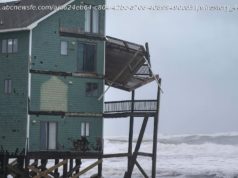Flight schedules in Texas were snarled for a second consecutive as the remnants of Hurricane Harvey wreaked havoc there.
Embed
Share
Flight schedules in Texas were snarled for a second consecutive as the remnants of Hurricane Harvey wreaked havoc there. Cancellations already stretched into Monday.
On Sunday, all flights were halted Houston’s Hobby Airport while schedules at Houston’s Bush Intercontinental Airport were a fraction of normal. All big U. S. airlines were waiving change fees for fliers ticketed to fly to the region.
Nationwide, airlines had grounded nearly 1,400 flights as of 8: 15 a.m. ET Sunday morning, according to flight-tracking service FlightAware. The bulk of those came in Houston and at other Texas airports, many of preemptively canceled sometime on Saturday.
Sunday’s problems marked the second consecutive day of severe flight disruptions in the region. More than 1,100 flights were grounded nationwide on Saturday, most because of Harvey, and it could be days before airline schedules return to normal.
Already on Monday, about 380 flights had been preemptively canceled as of 8: 15 a.m. ET. Combined with about 200 cancellations from Friday, more than 3,000 flights have been grounded nationwide since during the past three days – with most attributable to Harvey.
Houston’s busy Bush Intercontinental and Hobby airports were saddled with delays and cancellations that ultimately scrubbed a sizable portion of all flights. Some flights continued to operate at the airports on Saturday, but only a fraction of what would be normally expected.
Sunday was worse.
All flights were grounded at Houston’s Hobby Airport, where floodwaters had covered runways, according to local media reports. Hobby is one the busiest hubs for Southwest Airlines and has service on several other big U. S. carriers.
“The runways at Hobby are currently unusable and no flights are operating at this time. Contact your airline for rescheduling/waivers, ” the Houston Airport Systems said early Sunday on its website.
It was unclear when flights might resume, though the Federal Aviation Administration’s flight delay page suggested it could be closed through mid-week .
At Houston Bush Intercontinental, about 870 of Sunday’s flights had already been grounded by early Sunday morning. That accounted for about 75% of the day’s schedule there.
United, which operates one of its busiest hubs at Bush Intercontinental, grounded its entire United Express regional operation there for the second day in a row. United also said it would scrub all of its “mainline” flights in Houston, except for those operating to its other hubs and to long-haul international destinations.
“Our team will continue to monitor the situation and adjust our schedule as needed, ” Hobart said to USA TODAY’s Today in the Sky blog .
At airports such as Corpus Christi and Harlingen, virtually all flights had been grounded since Friday.
In Corpus Christi, officials said late Saturday that the airport received “only minor damage, ” but that the “terminal and airfield remain closed to normal traffic.” It was unclear when commercial flights might resume there.
Only minor damage at the airport. Terminal and airfield remain closed to normal traffic.
Delays and cancellations had become a problem even at big airports farther inland.
At both Austin and San Antonio, nearly a quarter of all flights had been canceled on both Sunday and Saturday, according to FlightAware’s calculations. In Dallas, about 60 flights – or nearly 15% of the day’s schedule had been grounded – mostly the result of canceled Southwest flights from Houston and other destinations in south Texas.
Customers flying to any airport in the region during the next few days should check ahead on the status of their flights. Fliers should also consider airlines’ flexible rebooking policies to move their flights to dates after the storm.
Even nationwide, Harvey could create sporadic disruptions. A flight from Chicago to San Francisco, for example, could become delayed or canceled if the plane or crew scheduled to fly it gets knocked off track by the problems in Texas.
However, airlines have become more aggressive in trying to prevent that scenario in recent years. That’s why it’s more common to see large blocks of preemptive cancellations these days; it’s all part of the industry’s efforts to contain weather-related ripple effects during extreme storms.
By grounding flights altogether ahead of poor weather, airlines hope to accomplish two main objectives. First, they can try to keep their aircraft and crews from becoming unexpectedly stranded if weather worsens faster than expected. Second, by having idled planes (and crews) waiting at the ready, carriers say they’ re able mobilize quickly with a nearly full schedule once conditions allow flights to resume.






